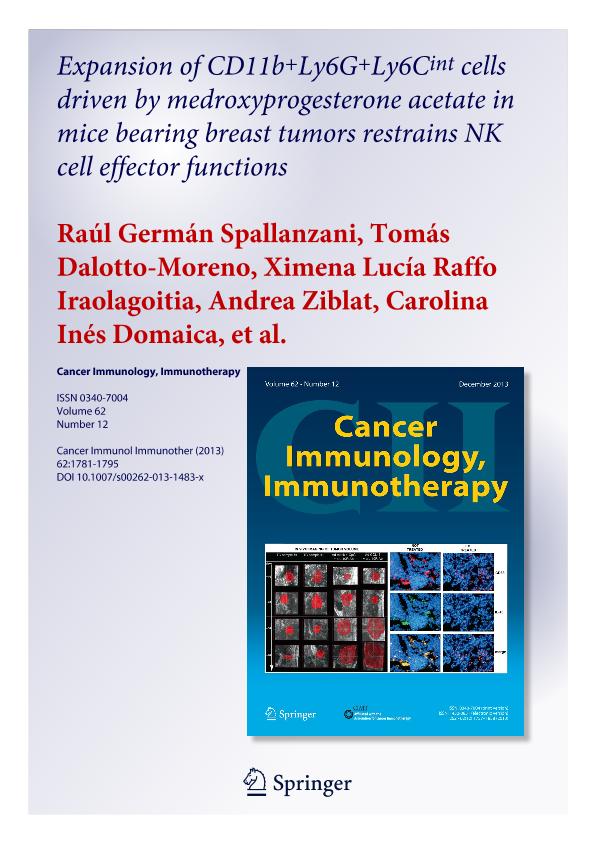Artículo
Expansion of CD11b+Ly6G +Ly6Cint cells driven by medroxyprogesterone acetate in mice bearing breast tumors restrains NK cell effector functions
Spallanzani, Raúl Germán ; D'alotto Moreno, Tomas
; D'alotto Moreno, Tomas ; Raffo Iraolagoitia, Ximena Lucía
; Raffo Iraolagoitia, Ximena Lucía ; Ziblat, Andrea
; Ziblat, Andrea ; Domaica, Carolina Ines
; Domaica, Carolina Ines ; Avila, Damian Ezequiel Gualberto
; Avila, Damian Ezequiel Gualberto ; Rossi, Lucas Ezequiel
; Rossi, Lucas Ezequiel ; Fuertes, Mercedes Beatriz
; Fuertes, Mercedes Beatriz ; Battistone, Maria Agustina
; Battistone, Maria Agustina ; Rabinovich, Gabriel Adrián
; Rabinovich, Gabriel Adrián ; Salatino, Mariana
; Salatino, Mariana ; Zwirner, Norberto Walter
; Zwirner, Norberto Walter
 ; D'alotto Moreno, Tomas
; D'alotto Moreno, Tomas ; Raffo Iraolagoitia, Ximena Lucía
; Raffo Iraolagoitia, Ximena Lucía ; Ziblat, Andrea
; Ziblat, Andrea ; Domaica, Carolina Ines
; Domaica, Carolina Ines ; Avila, Damian Ezequiel Gualberto
; Avila, Damian Ezequiel Gualberto ; Rossi, Lucas Ezequiel
; Rossi, Lucas Ezequiel ; Fuertes, Mercedes Beatriz
; Fuertes, Mercedes Beatriz ; Battistone, Maria Agustina
; Battistone, Maria Agustina ; Rabinovich, Gabriel Adrián
; Rabinovich, Gabriel Adrián ; Salatino, Mariana
; Salatino, Mariana ; Zwirner, Norberto Walter
; Zwirner, Norberto Walter
Fecha de publicación:
11/10/2013
Editorial:
Springer
Revista:
Cancer Immunology Immunotherapy
ISSN:
0340-7004
e-ISSN:
1432-0851
Idioma:
Inglés
Tipo de recurso:
Artículo publicado
Clasificación temática:
Resumen
The progesterone analog medroxyprogesterone acetate (MPA) is widely used as a hormone replacement therapy in postmenopausal women and as contraceptive. However, prolonged administration of MPA is associated with increased incidence of breast cancer through illdefined mechanisms. Here, we explored whether exposure to MPA during mammary tumor growth affects myeloidderived suppressor cells (MDSCs; CD11b+Gr-1+, mostly CD11b+Ly6G+Ly6Cint and CD11b+Ly6G−Ly6Chigh cells) and natural killer (NK) cells, potentially restraining tumor immunosurveillance. We used the highly metastatic 4T1 breast tumor (which does not express the classical progesterone receptor and expands MDSCs) to challenge BALB/c mice in the absence or in the presence of MPA. We observed that MPA promoted the accumulation of NK cells in spleens of tumor-bearing mice, but withreduced degranulation ability and in vivo cytotoxic activity. Simultaneously, MPA induced a preferential expansion of CD11b+Ly6G+Ly6Cint cells in spleen and bone marrow of 4T1 tumor-bearing mice. In vitro, MPA promoted nuclear mobilization of the glucocorticoid receptor (GR) in 4T1 cells and endowed these cells with the ability to promote a preferential differentiation of bone marrow cells into CD11b+Ly6G+Ly6Cint cells that displayed suppressive activity on NK cell degranulation. Sorted CD11b+Gr-1+ cells from MPA-treated tumor-bearing mice exhibited higher suppressive activity on NK cell degranulation than CD11b+Gr-1+ cells from vehicle-treated tumor-bearing mice. Thus, MPA, acting through the GR, endows tumor cells with an enhanced capacity to expand CD11b+Ly6G+Ly6Cint cells that subsequently display a stronger suppression of NK cell-mediated anti-tumor immunity. Our results describe an alternative mechanism by which MPA may affect immunosurveillance and have potential implication in breast cancer incidence.
Archivos asociados
Licencia
Identificadores
Colecciones
Articulos(IBYME)
Articulos de INST.DE BIOLOGIA Y MEDICINA EXPERIMENTAL (I)
Articulos de INST.DE BIOLOGIA Y MEDICINA EXPERIMENTAL (I)
Articulos(OCA CIUDAD UNIVERSITARIA)
Articulos de OFICINA DE COORDINACION ADMINISTRATIVA CIUDAD UNIVERSITARIA
Articulos de OFICINA DE COORDINACION ADMINISTRATIVA CIUDAD UNIVERSITARIA
Citación
Spallanzani, Raúl Germán; D'alotto Moreno, Tomas; Raffo Iraolagoitia, Ximena Lucía; Ziblat, Andrea; Domaica, Carolina Ines; et al.; Expansion of CD11b+Ly6G +Ly6Cint cells driven by medroxyprogesterone acetate in mice bearing breast tumors restrains NK cell effector functions; Springer; Cancer Immunology Immunotherapy; 62; 12; 11-10-2013; 1781-1795
Compartir
Altmétricas



